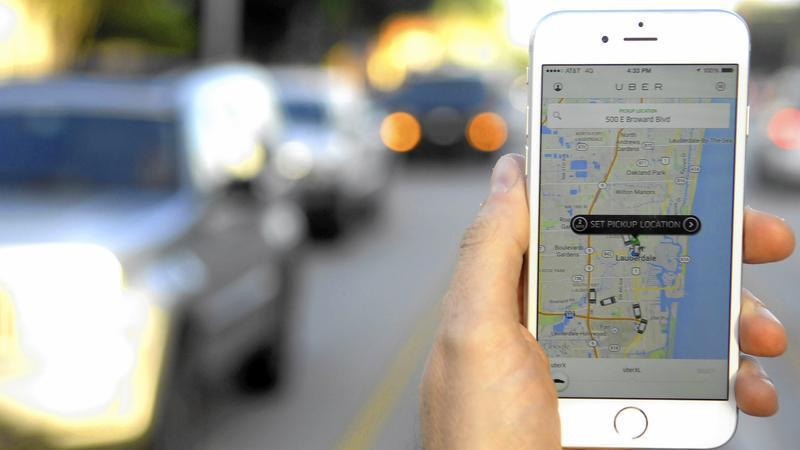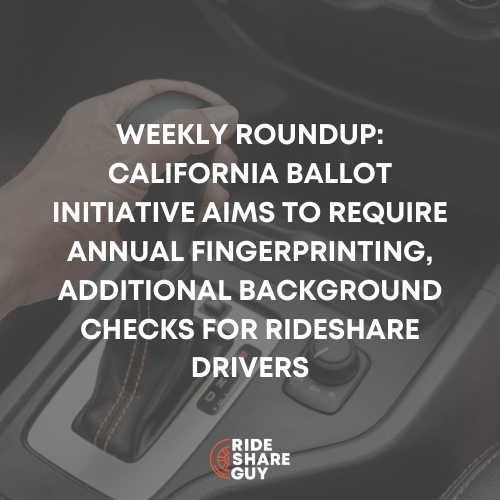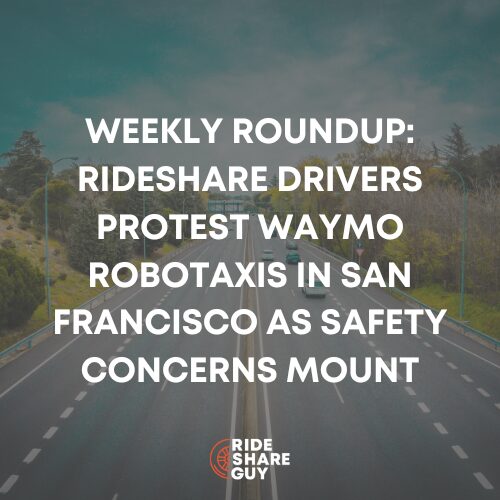Today, we’re trying something new and reporting on a current event in the world of rideshare and how it will affect drivers. Our regular rideshare round-up of all the top news stories from the week will be published tomorrow. But today, RSG contributor, Christian Perea, takes a look at the real reasons why Uber is leaving Broward County. There is a lot of good analysis in this post and we break down exactly why these fights between Uber and local governments are breaking out and what they mean for drivers and passengers.
If you drive in Florida, you need to be aware that an important deadline is about to pass in Broward County on July 31st. A complete pull-out by Uber and Lyft from the Broward market. So if you are one of the unlucky Broward drivers whose job is on the line, that really sucks. But at the end of the day, this is all a political maneuver on behalf of Uber and Lyft. So let me explain how it works.

Every so often, a local government manages to pass actual legislation on Uber/Lyft. When this legislation includes fingerprinting, background checks, market controls on drivers, etc., Lyft and Uber almost always threaten to pull the plug. If the government doesn’t loosen the requirements, Uber and Lyft leave the market.
This has already happened in San Antonio, Buffalo, Kansas, Hamptons, New York and now Broward (just to name a few).
Usually Uber and Lyft will mobilize a full fledged political campaign composed of lobbyists, drivers, petitions, passengers, etc to get these laws overturned. As riders write, tweet and sign petitions to their local legislators, political pressure rapidly builds in support of Uber/Lyft. More often than not, an agreement is reached before the companies pull out of the market.
However, if all of the above brinksmanship fails, then Lyft and Uber will leave a market. Don’t think for a second that they are giving up though.
Background Checks, Drug Tests, and Insurance
Generally, three things will trigger Uber and Lyft to leave a market; Fingerprinting, drug-tests, and commercial insurance. Broward managed to hit all three of them. So good job Broward!
From a driver’s perspective, fingerprinting and licensing creates a barrier of entry for new drivers entering our market and over-saturating it. So in the short-term, drivers obviously win. More business for us drivers that are already on board and more surge for us. It is a no-brainer. So it seems.
However, this is a huge problem for Uber and Lyft because a big part of their business model is being able to easily scale up (and in the future scale down) the number of drivers. Adding FBI fingerprinting and drug tests creates an extra hoop for potential drivers to jump through.
Considering the quality of cab drivers (including the one that hit and run my car last week) I think it’s safe to say that the extra special background checks that the FBI or whatever state entity/fingerprinting company that takes your local politician to dinner every week is pretty close to worthless. Those who are timid about the invasion of privacy that comes from having your fingerprints stored in a government database will not bother to drive or sign-up. Those who are criminals already know how to fake their piss test because its more or less an IQ test.
Plus, myself and a lot of drivers think we should be allowed to smoke a blunt when we aren’t driving the towns drunks around. We need it after listening to Becky say “totes” for the 100th time or watching you slam our doors all night.
24/7 commercial insurance is also pretty impractical. It’s clear that insurance companies have a lot to gain from every driver purchasing separate commercial insurance policies instead of operating under something more universal like Uber or Lyfts insurance. Generally, Uber and Lyft will continue to operate in a market if this is the single issue however they will pay for any commercial insurance tickets that a driver receives. That being said, adopting the same commercial insurance as a limo or taxi will increase costs dramatically. This increases prices and now we end up at square one where transportation sucks for everybody again.
Uber and Lyft’s Strategy in Leaving
“If Uber or Lyft allow themselves to acquiesce to strict regulations from local governments, it will set a precedent with EVERY other city that they can create the same regulations, and thus the entire business model becomes threatened.”
Had Uber stayed in San Antonio last April, there would likely be a litany of local governments adding a bunch of silly regulations to each TNC driver. Fingerprinting, certificates, licenses, drug tests, draconian insurance requirements, fire extinguishers, first aid kits, cats in the trunk, etc.
The logic of local regulators is that all of those regulations were apparently effective at making cabs a reliable and safe mode of transportation that everybody loved before Uber. 😉
The problem with many of theses regulations is that they are often reactionary in nature and try to conform old regulations and rules to a new and innovative form of transportation.
When Uber or Lyft leave a market, they place themselves in a power position where they come across as the victim and paint the local government as a corrupt stalwart that is unwilling to accept new technology. I’m not saying that this is true, but it’s definitely their angle.
The Picture that Uber and Lyft Want to Paint
“An American tech company enters San Antonio/Tulsa/Broward and creates thousands of jobs almost overnight. It lowers instances of drunk driving. It costs 1/3rd as much as a taxi ride. Stimulates the local bar and restaurant scene, tracks its drivers via GPS and ratings to make sure that they are not rude. Fills transportation gaps from under-served communities. They have a faster response time than an ambulance……is forced to stop operating due to onerous restrictions by local governments and pressures from entrenched taxi and limo companies. Once again, government acts to destroy jobs due to shady bureaucratic interests under the guise of safety to prevent growth.”
It’s hard to to not look bad as a local politician if this sort of picture gains traction with voters. Regardless of your opinion on Uber and Lyft, there is no denying that they are popular services that have generated a great deal of public support. Uber and Lyft count on this popularity and pressure to get their way.
The End Strategy
A lot of people have gotten used to taking those cheap and convenient UberX/Lyft rides on the weekend. Once they are gone though, you can bet we still aren’t going to call for a cab. They sunk their own ship a long time ago for most of us (especially millennials) so instead, people will just demand that Uber and Lyft return to their market.
Not wanting to be painted as faceless bureaucrats (and often after election season is over), government officials are more willing to negotiate with Uber and Lyft on terms that allow them to return to the market. This is already happening in San Antonio.
Of course, if officials are unwilling to negotiate, Uber and Lyft can almost surely find a candidate that is more friendly to their cause. Someone who would be willing to bring back the popular, cheap service that vaguely creates jobs and fights against drunk driving. That person also just so happens to need campaign donations.
At the time of this article, Uber had over 70k signatures on a petition to keep Uber in Broward. You can sign the petition yourself here.
I don’t think that Uber and Lyft will leave places like Broward and San Antonio forever. They are just being patient and fighting industry stalwarts with an effective strategy. In the end there will likely be a middle-ground in regulations that allows for everybody to operate and prosper. Except taxis.
So if you’re a driver in one of these war-torn Uber cities, know that Uber will be back, but it is a very real possibility that you could go a few weeks or worst case scenario, a few months without any Uber income. If anything, it may be a good time to really motivate yourself to find another source of income or maybe even start a side business that will align with your driving. That way, when Uber does come back, you’ll be even better off than you were before.
How This Strategy Could Backfire for Uber and Lyft
So far, Uber pulling out and often times, just threatening to pull out has sent a pretty strong message (New York is a great example of this). If your local government passes a certain threshold of regulations (usually FBI fingerprinting and piss tests), Uber and Lyft will leave your market. Okay, well now every city government and taxi lobby knows exactly what they need to do to get Uber and Lyft to leave their market.
The cab union gets its ultimate demand. Lawmakers can still make a case for appearing to be willing to work with ride-hail companies while painting Uber and Lyft as too arrogant to accept regulations. This creates an easy way to accept campaign financing from the Cab and Limo Lobbyists without facing the risks of angering the public.
This could place Uber and Lyft in a long term position where they will have to eventually accept the conditions of local governments. The question becomes how they can steer it in such a way as to make it efficient and safe for all parties involved. Considering that the services are superior and supported by the public I don’t see this happening on a wide scale but you never know.
At the end of the day, Uber is offering a service that the public loves and Uber has a lot at stake in regards to keeping the barrier to entry very low for its drivers. Ultimately, there will be a few cities that try and fight Uber but as we saw this past week in New York, public pressure can have a big impact on politicians.
Drivers, what do you think about the news that Uber is pulling out of Broward County? Will they really pull out or do you think the government will come to a last minute agreement with Uber? If you’re a driver in Broward County, we’d love to hear from you. What are your plans if Uber leaves?
-Christian @ RSG





